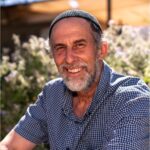In 1953, Mordecai Kaplan wrote an important volume, A New Zionism. We asked four contributors to reflect on this question.
- What is the new element of a new, New Zionism that needs to be added fifty years later, in 2023?
- How can the “new element” reflect sensitivity to the present crisis regarding democracy in Israel?
Their responses remind us of the complex weaving of the religious, national, and ethical threads of Kaplanian thought.
The focus on Israel’s rich but delicate place in Kaplanian thought, especially as we move deeper into the 21st century, is also reflected in our April 23rd webinar and an article about a conference staged by The Kaplan Center in Jerusalem this past July.
From Rabbi Michael M. Cohen

In A New Zionism (p.93), Rabbi Mordecai Kaplan wrote:
“It is amazing to note that Ben-Gurion, writing in The New York Times Magazine of March 28, 1954, speaks of ‘the reemergence of the Jewish State,’ as though the State of Israel were the same kind of Jewish state as that which the Romans destroyed in 70 AD…(Kaplan then quotes Herzl) ‘When our work is done, I believe that a Jewish citizen, namely, a citizen of the Jewish State will not be forbidden to marry a foreigner. She will be politically Jewish, irrespective of her religion…Incidentally, you could advance some striking precedents: if I am not mistaken, Moses was married to a Midianite.”
Here Kaplan tackles the issue of “Jewish” identity and the State of Israel. It goes back to the nation or religion question of what it means to be a Jew, and in this case the citizen of the Jewish State. For 2,000 years of exile, we presented as a religion to ourselves and the outside world, even as we carried the seeds of national identity within that religious identity. Writing in 1942, Martin Buber wrote in his essay “On Hebrew Humanism”:
“Israel is not a nation like other nations, no matter how much its representatives have wished it during certain eras. Israel is a people like no other, for it is the only people in the world which, from its earliest beginnings, has been both a nation and a religious community.”
That double component of our identity compliments who we are, as well as being the cause of tension, and for some, confusion. What Kaplan offers, in this case of marriage, is that being Jewish in the Jewish state is a condition where the national aspect of that identity takes precedence over the religious composition of that identity. In his eyes, in a nation there are no restrictions on whom you can marry based on your religious or national differences – for Kaplan that included the Jewish State, as Jewish is also a political identity for him. Such an orientation opens many possibilities for the institutions and laws of the Jewish State.
From Rabbi Barbara Penzner

One caveat before proposing a new New Zionism, based on Kaplan’s vision:
As a social justice activist, I have learned the importance of being an ally to the people who are directly affected by injustice. Which means, in terms of Israel today, the vision of Zionism must arise from and be informed by the Israelis who live the Zionist reality every day.
As allies we might offer perspective to help heal the historic fissures in Israeli society. These rifts are rooted in the experiences and attitudes of waves of immigrants and refugees, and those who have lived on the land for generations. Young secular Israelis today argue that Jewish and Israeli identity need to be uncoupled from religious identity and practice.
A new New Zionism must ask questions to help imagine a shared civil society for the future, drawing on the past.
What would distinguish Israel as a country if it were not a Jewish state?
What cultural values do the tribes (peoples?) of the land of Israel share, such as the importance of family, hospitality toward the stranger, caring for and about the land, and devotion to the history and memory of the land? Is peoplehood large enough to encompass Israeli citizens who are not Jews?
Drawing on Kaplan’s ideas, a new New Zionism demands a reckoning with the meaning of peoplehood and Judaism as a civilization.
- Can the Jews of Israel come together in the name of peoplehood?
- Does that concern for peoplehood allow for a respectful relationship with Diaspora Jews?
- Is peoplehood large enough to encompass Israeli citizens who are not Jews?
Judaism as a civilization may provide a broader framework.
- Can the State of Israel understand itself as part of a civilization that encompasses all Jews, not to mention its non-Jewish citizens and residents?
- What would enable all who dwell in the land to thrive in, contribute to, and feel pride in the State?
From Rabbi Gail Shuster-Bouskila

Questions abound about the future essence of Israeli identity; there are many conflicting views on what will happen in the next 75 years of Israeli statehood. Since the beginning of 2023, the State of Israel has been facing fundamental political changes. Obviously when any government decides to amend laws, there are always those who object. However, the recent legislative attempts and backlash have been qualitatively different. A large part of the population, committed to democracy and liberal ideas, has been attending weekly protests across the country due to these changes.
Beyond the resistance to changes in the balance of power between the Israeli Supreme Court, the Knesset and the government, many “middle of the road” Israelis wonder about the possibility of Israeli non-orthodox life under increasingly centralized fundamentalist religious rule. Moreover, these Israelis have been motivated to question their support for the government that funds Ultra-orthodox institutions over secular ones because most of those who pay taxes and those doing army service are secular and modern orthodox Israelis (primarily not settlers in the West Bank).
Recently, I have been looking for encouragement to be able to keep protesting:
While Kaplan was at times ambivalent about classical Zionism, he was at all times fully devoted to the ethical ideals that he believed were incumbent upon every Jew in every place—and that includes the State of Israel. It was in these ethical ideals, the sum and substance of Jewish peoplehood, that Jewish unity lay and on which Jewish survival depended.
Scult, Mel. The Radical American Judaism of Mordecai M. Kaplan (The Modern Jewish Experience) (p. 109). Indiana University Press. Kindle Edition.
From Dr. Nadav S. Berman

Israeli Democracy as a Civilization: What Would Mordecai M. Kaplan Think of Today’s Crisis?
The ongoing democracy crisis in Israel, which started in winter 2023, concerns the question of Israel’s constitutional structure, as well as several foundational problems with which Israeli society has already grappled for a long period: the Arab/Palestinian-Israeli conflict, religion and state (or Judaism and democracy), environmental issues, over-population, and more. Most of these problems were known to Mordecai M. Kaplan, one of the main Jewish thinkers of the 20th century.
Though Kaplan did not focus on the question of Israel’s constitutional structure, his writing may shed some light about the present democracy crisis. For Kaplan, similar to John Dewey, democracy is more than a mechanism: it is a civilization, a civilizing and educational process, and a moral ethos predicated on religious beliefs, and on a kind of prophetic hope. We may think of three Israeli issues to which Kaplan’s thought may be relevant: (1) Can the Israeli democratic project survive a societal schism? (2) What should be the proper place of religion, or of Judaism, in the public Israeli sphere? (3) And most central for the present legal dispute: Should the governmental (executive) branch override the judicial? Let us consider these questions in turn.
- Israeli Society: An influential voice within the Israeli right wing makes use of the Marxist idea of class struggle. This ideational schism is not only opposed to the idea of social cohesion (or in Hebrew, likkud) but also to Israel’s first PM, David Ben-Gurion, who insisted that the Jewish people and Israeli society must shift from class struggle to a nationhood union (mi’maamad le’am, in DBG’s words). Kaplan’s holistic pragmatism would probably reject fiercely the sharp division of Israeli society into oppressors and oppressed, which makes it much harder to create a shared and productive discussion about amending and ameliorating problems, in the spirit of Ethical Nationhood. Kaplan held that distributive justice is indispensable concern for democratic societies. Marxism, however, is more helpful in analyzing social gaps than in getting to solve them, precisely because Marxism usually dissects society, while social repair requires a sense of constructive groupness.
- Religion and State: Kaplan believed wholeheartedly in the constitutional separation of church and state, or religion and state as it is termed today. However, based on what Kaplan wrote in Judaism as a Civilization (pp. 76-79), the ‘Catholic’ component in Jewish collectivity may require a different setting than the (allegedly ‘Protestant’) one deployed in the USA; this in fact might be true for any other nation-state. Would Kaplan be satisfied with the contemporary centralization of the center-left public opinion in Israel, which is a dramatic result of the public protest against the legal overhaul? Kaplan would obviously be hesitant, as he knew very well the pitfalls of nationalism in the 20th century, but he might be thinking that a democratic spirit must involve a capacity to understand (and even sympathize) with humanist religious commitments of one’s public; and after all, most Jewish Israelis are pro-traditional in one way or another. Such a pragmatist inspired acknowledgment may help in deliberating how the flaws in Israel’s religious institutions could be amended in a non-illusory manner.
- Kaplan had no illusions about the dangers of absolutist governments. He would thus, I believe, be deeply concerned by the (admittedly dictatorial) attempt to give the government the ability to alter the Supreme Court’s juridical body, surely when its Prime Minister is on trial and has an undeniable conflict of interest. Kaplan, as any sober fallibilist, would think that no legal system is infallible. However, constitutional maneuvers should not (surely from a Conservative point of view) be conducted so rapidly, while rushing relevant Knesset Committee discussions in a way which resembles a putsch rather than a beit midrash. Would Kaplan support President Herzog’s “People’s Outline”? Hard to tell. But he would probably think that the dialogue, the negotiation path, are crucial. Both sides should get out of their comfort zone. This is maybe the only way that the Israeli democratic middle can be released from the tenacious grasping of the powerful extremists of all camps.
Kaplan’s Zionism, then, remains a source of inspiration, in cases when his pragmatist opinion remained valid for us, as well as in cases where his radical opinion needs some revisions. In fact, in an age when a convicted terror activist was appointed by Netanyahu as a minister in Israel’s government, the tension between pragmatism and radicalism is worthy of further reflection. Kaplan, like most intellectuals, embraced both pragmatism and radicalism, at times even dogmatism. In any event, his penetrating understanding of Jewish civilizational processes more broadly, remains vital and stimulating.
From Rabbi Bob Gluck

Givat Haviva, Israel and a vision of a shared society, in light of Mordecai Kaplan’s teachings
November 6, 2023
Maybe it is precisely during times when peace between Jews and Palestinians seems most distant and unattainable that it is most essential for us to maintain a long view. As difficult as this may seem to place the politics aside, Israel’s sustainable, secure, and just existence may well depend upon some vision of a shared society. Concurrent with the unabating struggles regarding the West Bank and Gaza, there are cities and villages within Israel that have mixed or adjoining Jewish and Palestinian/Arab populations.
The ability of such communities to support and rely upon mechanisms for constructive coexistence and, ideally, cooperation requires constant attention, skill, and commitment. Yet, as is well known, Jewish and Arab youth in Israel, to offer one example, lead substantially segregated lives. Fewer than ten percent have relationships with young people in communities of “the other.” Mordecai Kaplan’s conception of Zionism placed the land of Israel at the center of a revitalized international Jewish people. Kaplan’s Zionism predates the founding of the State of Israel and as articulated in 1934 in his foundational book Judaism as a Civilization, represented a minority view. Kaplan advocated or a Land of Israel, but not necessarily a national state, that would become a radiating center of Jewish culture, creative ideas, and energy for Diaspora communities, including the United States. One of those principles would be democracy and coexistence, not only within Jewish society, but a building block of justice of coexistence within Israel between Jews and its Arab inhabitants. In March 1937, during a period of violence, he wrote in The Reconstructionist, “lasting peace in Palestine will not be realized until Zionists formulate a clear and unequivocal program of cooperation with the Arab people.” As Rabbi David Teutsch summarizes in an article on the Reconstructing Judaism website (May 4, 2016), “for Reconstructionist ideology the long-term safety of a Jewish state is dependent upon the triumph of liberty and social justice not only for Israelis but for Arabs as well.”
Coexistence between Jews and Palestinians/Arabs within Israel is thus at the heart of Kaplan’s vision of Zionism, as it has remained within the Reconstructionist movement. In fact, there are several shared society institutions in Israel. While the Arava Institute for Environmental Studies and Neve Shalom/Wahat al-Salam may be better known to our readers, one of the longest-standing is Givat Haviva, founded in 1949. Its programming is focused on an educational model for young people that bridges divisions and seeks to build and sustain dialog and partnerships that span historically divided communities, particularly between neighboring Israeli Jewish and Arab towns, villages, and regional councils. The goal is to foster mutual understanding and realize mutually shared needs and interests. Its work also contributes to knowledge available for communities outside Israel to address conflict resolution and coexistence. For more information about these projects: https://www.givathaviva.org/Partnering-to-Advance-Mutual-Interests
Givat Haviva runs programming within public schools and maintains an international residential secondary school that offers an International Baccalaureate Diploma. Regarding these school programs, see: https://www.givathaviva.org/index.php?dir=site&page=content&cs=3177.
For more than two decades, Givat Haviva has also sponsored a mixed youth photography program, Through Other’s Eyes. By literally and metaphorically looking through each other’s “lenses,” high school students learn to better understand the lives of their peers. This is achieved through their shared artistic endeavors and
by facilitating visits to each other’s homes, families and communities. Friendships are built and
relationships between communities built and maintained. About the various Arts projects that take
place at Givat Haviva, see https://www.artcenter.org.il/cgi-webaxy/item?531.
Givat Haviva is also involved in a wide range of projects promoting social equality within Israel. For more
information: https://www.givathaviva.org/Equality.
I am writing during the aftermath of the October 7, 2023 attack by Hamas on Israeli communities in the South of the country. Thus it is worth noting that Givat Haviva has been active engaged in providing emergency aid for Israelis, including housing more than 200 people who have been displaced from their homes. For all these reasons, the work of Givat Haviva is a model of Kaplanian ideals in practice: shared society, justice, democracy, and equality. For more information, please see https://www.givathaviva.org/Mission-Statement.
Please submit your commentary here. We’ll post selected submissions on this page.
